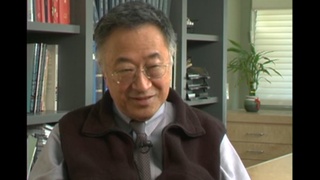Interviews
Apprehension about leaving camp
Because I was reluctant to leave, they were trying to push me out, because they said, Well, your two children are out. You've got to leave camp. And I said, "Well, I can't leave my mother and dad here by themselves." And they said, "Well, don't worry, because Hank was gonna come and get them," so I finally... I had quite a debate with my daughter, because I didn't want to go Chicago, but she did. I wanted to come back to Seattle. No, she wanted to go to a big city. She was just bent on going -- we got in a terrible argument.
So I had to go before a counselor, which was very unpleasant for me, because they were all trying to get me out. So there was just no way that I was gonna win. But I didn't want go because I was afraid, for one thing. You know, you don't have any money and you don't have no experience, you're working in a strange city. In the first place, I didn't like cities. But they finally forced me out and I had to go.
Date: September 15-17, 2004
Location: Washington, US
Interviewer: Alice Ito
Contributed by: Denshō: The Japanese American Legacy Project.








